It is not sufficient to just set up profiles on social media sites; it is critical to use social media analytics to exploit more information, assess performance, and generate better results. That being said, numerous advanced social media analytics tools exist that can be used to analyze the new trends of 2024.
Now, this blog will explain and discuss what exactly social media analytics is, why it is important for today’s business entities, and how they can monitor it efficiently. We have also outlined 15 powerful social media analytics tools that can help you develop your social media activities.
What is Social Media Analytics?
Social media analytics can be defined as the method of capturing information from social media sites like Facebook, twitter, instagram, or Linked In and then organizing, processing, analyzing, and presenting this information to enable firms to understand user characteristics, level of usage and effectiveness of their social media marketing strategies.
Through social media analysis, organizations are able to have meaningful recommendations on who that audience is, what that audience needs, and how best to meet those needs.
Why to Use Social Media Analytics Tools
1. Measure Performance:
Businesses mainly rely on qualitative data; with social media analytics, businesses get a numeric figure that gives them the ability to quantify the results of their social media marketing strategies.
2. Understand Your Audience:
In addition to the user demographics, interests, and behaviors, the corresponding information will provide valuable insights which will help to create better content and attract more users.
3. Identify Trends and Opportunities:
Through the help of analyzing social media, companies can be able to point out trends. These topics are popular and influencers in a specific industry that will enable them to take advantage of opportunities which is an advantage when it comes to competition.
4. Optimize Strategies:
Using qualitative data on various types of posts, the best time for posting, and the engagement rates, business entities can enhance their usage of social media immensely for the greatest impact.
5. Measure ROI:
Through social media analytics, organizations gain insights into their engagements’ effectiveness, which provides tangible metrics useful in determining the ROI realization of their social media projects, thus helping optimize resource management.
15 Best Social Media Analytics Tools of 2024
1. Hootsuite
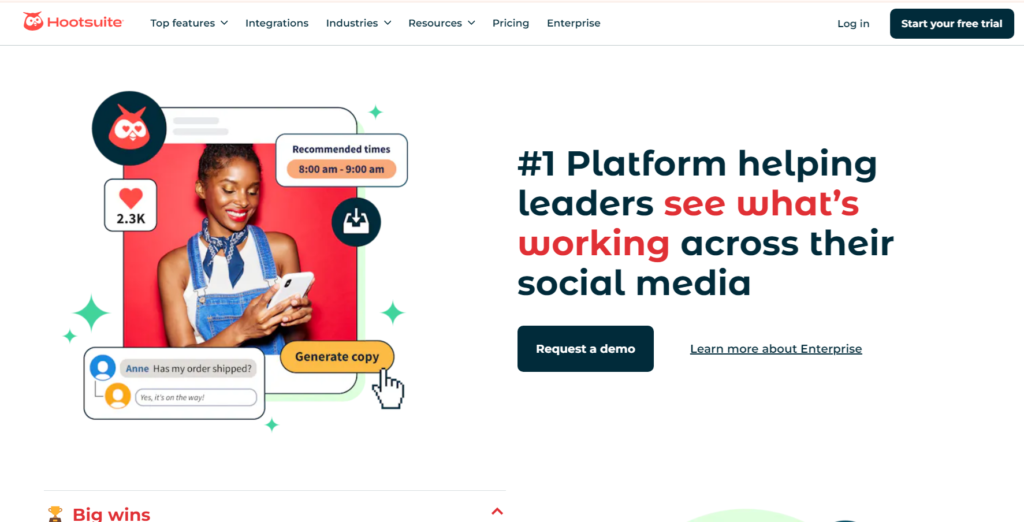
Hootsuite is a social media suite which is capable of monitoring and scheduling messages across one or multiple accounts as well as analyzing social media activity.
Key Features:
The unified social media inbox, the tools for scheduling and publishing, the option for team collaboration, real-time analytics, and customization of reports, alongside the incorporation of various social networks.
Pros:
- User-friendly interface
- Scalable and powerful analytics and business intelligence and reporting tools
- Team management and collaboration features
Cons:
- Limited customization options
- Higher revenues usually come with much higher costs.
- The steep learning curve for a complex analytics
Website: https://www.hootsuite.com/
2. Sprout Social
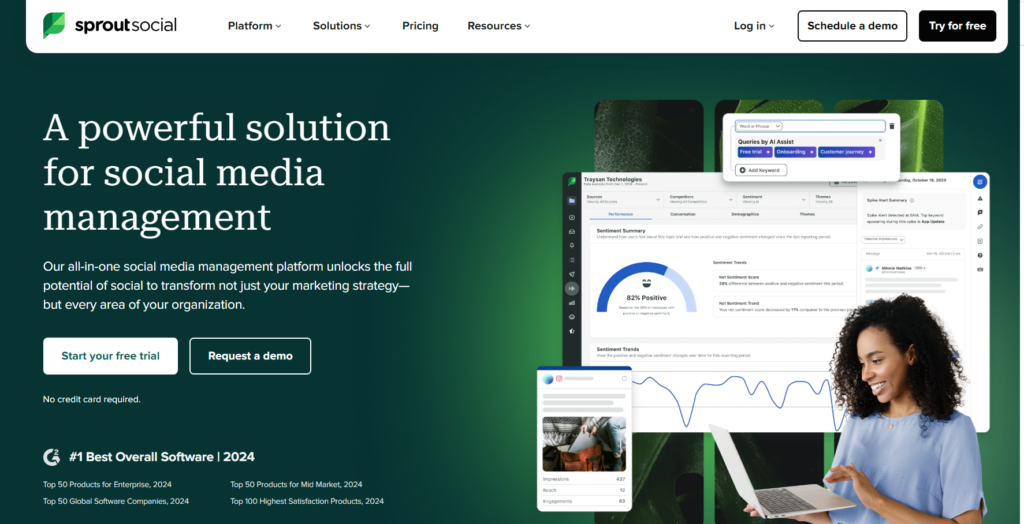
Sprout Social is a comprehensive social media tool and insights solution for businesses in all industries and sizes.
Key Features: Social listening and publishing, scheduling, inbox, analytics and reports, rivals analysis, sentiment, and collaboration.
Key Features:
Social listening and publishing, scheduling, inbox, analytics and reports, rivals analysis, sentiment, and collaboration.
Pros:
- User-friendly interface
- Scalable and powerful analytics and business intelligence and reporting tools
- Team management and collaboration features
Cons:
- Limited customization options
- Higher revenues usually come with much higher costs.
- The steep learning curve for a complex analytics
Website: https://sproutsocial.com/
3. Buffer
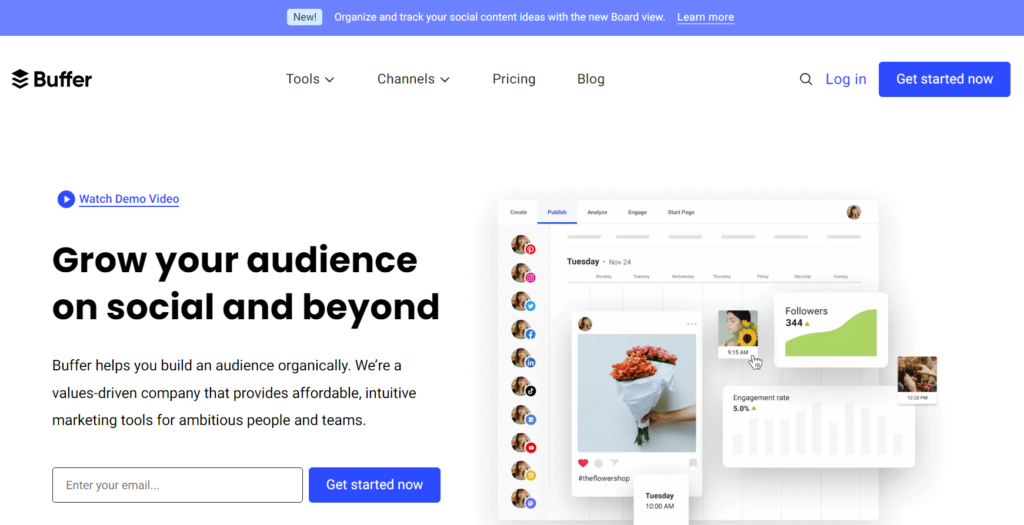
Buffer is an online social media management tool that specializes in Managing, Posting, and Analyzing social content on social media platforms.
Key Features:
Social updates, promotion, analytics, and post scheduling, task and team collaboration, browser extensions, and mobile apps for easy posting.
Pros:
- User-friendly interface
- Affordable pricing
- Add ons for browsers to make the management of scheduling easier
Cons:
- Limited advanced analytics features
- By far, it lacks integration with social networks compared to its competitors
- Limited team collaboration features.
Website: https://buffer.com/analyze
4. HubSpot
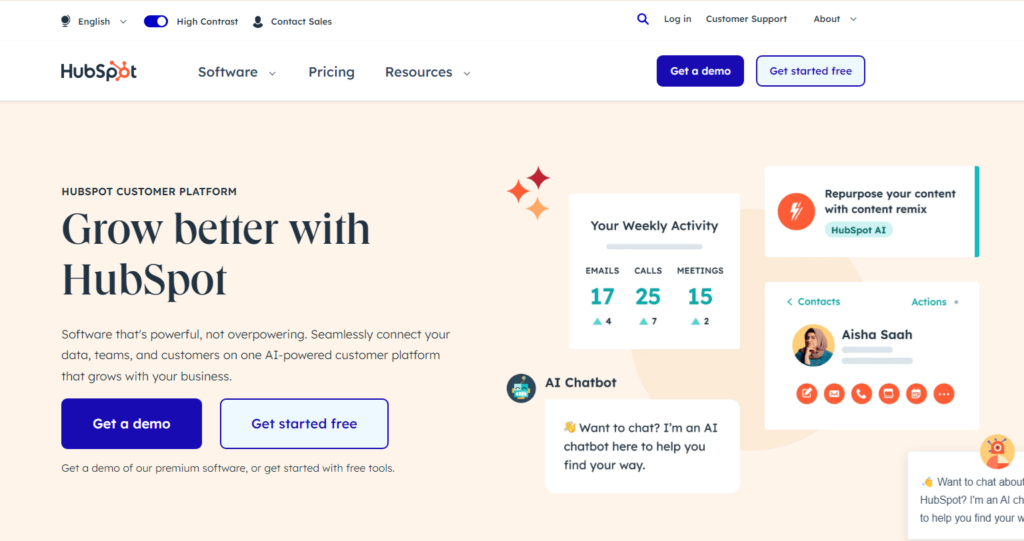
Hubspot is an intensive inbound marketing and sales tool that offers integrated social media marketing and evaluation tools.
Key Features:
Social and blog publishing and posting, social and content scheduling, social and content monitoring and tracking, insights and reports, gathering leads and nurturing, functionality with HubSpot CMS and third-party apps.
Pros:
- It empowers the social media analytics and reporting process
- HubSpot has integrated with other tools in its marketing and sales offerings.
- Lead generation and nurturing
Cons:
- Weak IRI’s social media management
- Difficulties are very much in evidence when non-HubSpot users are considered
- Small business operators are likely to experience higher costs when using the HRM.
Website: https://www.hubspot.com/
5. Later
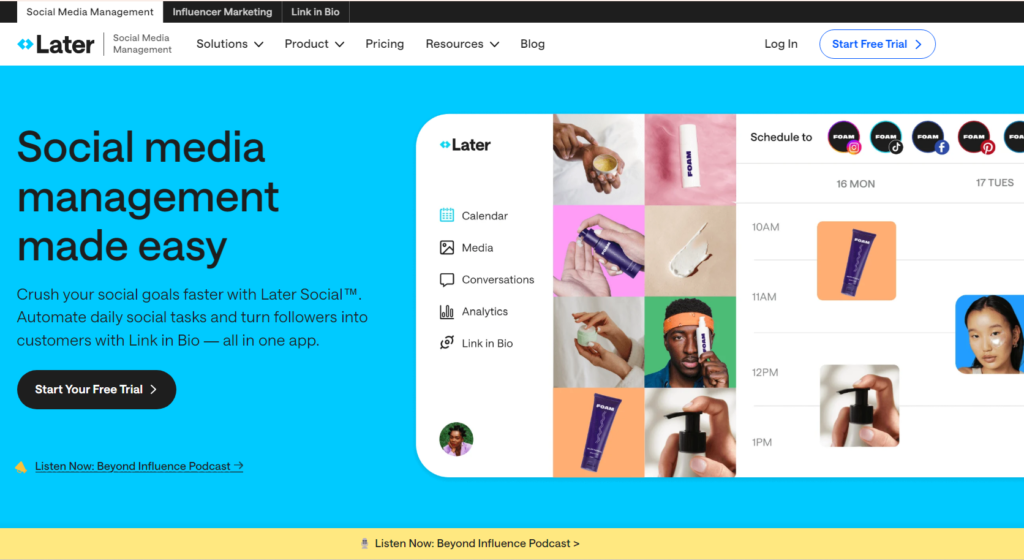
Later is the best social media management and tracking solution for visual content and targeting Instagram marketing.
Key Features:
That includes content scheduling and posting, analytics and reporting, hashtag search and analysis, gathering user-created content, and integration with the online shopping.
Pros:
- Interactive content and media planning and distribution capabilities
- More value from Instagram analytics and reporting
- Shopping feature for e-commerce products
Cons:
- Limited features for non-visual content, and other social media platforms
- Relatively higher price on its product especially for the additional features.
Website: https://later.com
6. Rival IQ
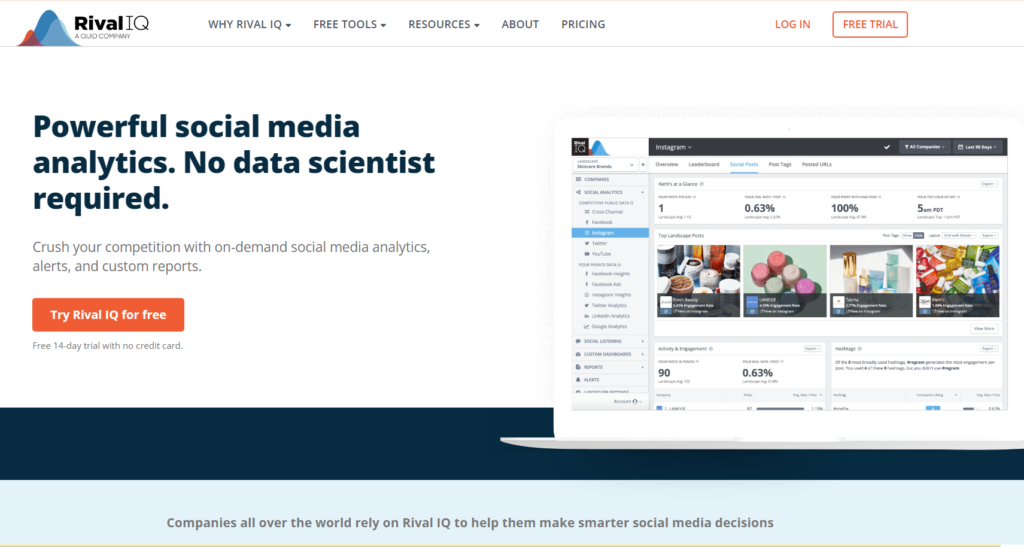
It is a benchmarking and market research tool used to measure companies’ performance against competitors primarily used for social media.
Key Features:
Market analysis and market positioning, evaluation of social media utilization and performance, textual analysis and suggestions for content generation, sharing through groups and teams and with connected social networks.
Pros:
- Deep understanding of the marketing environment, competitor profiling and benchmarking skills
- A detailed discussion of the content and recommendations
- Team collaboration features
Cons:
- Few bundles of social media that are specially marketed for management
- Relatively higher pricing structures for small businesses as compared to other firms.
- Steep learning curve for even more complex analytics.
Website: https://www.rivaliq.com/
7. Talkwalker
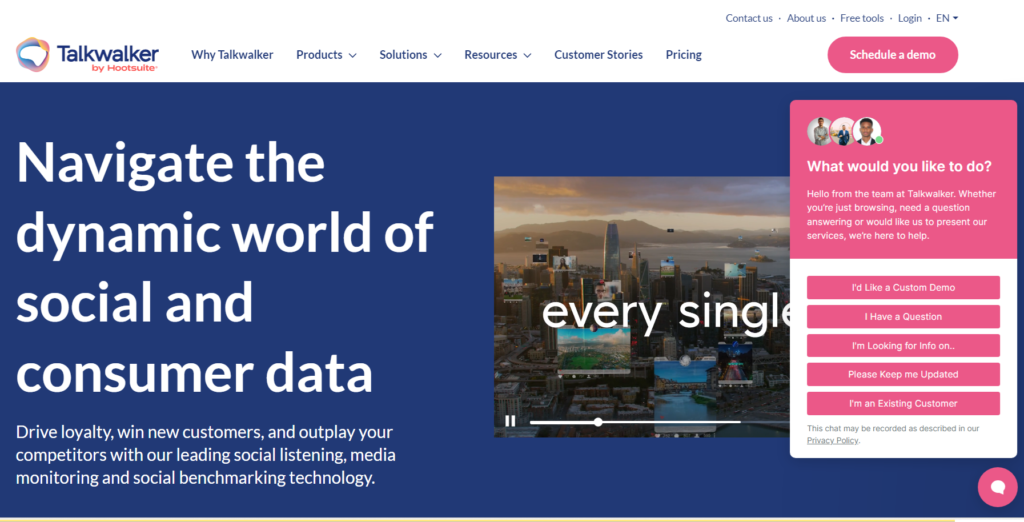
Talkwalker is one of the social media analytics and listening tools that help analyze trends in social media, give real-time results, and monitor the sentiment of the content.
Key Features:
Social media monitoring and listening, that lets define the clients’ moods; sentiment analysis, which shows the tendencies of clients’ reactions; the identification of influencers and the detection of trends; the opportunities for creating more detailed reports and visualizations; the integration with numerous social networks.
Pros:
- Feature-wise, the capabilities in social listening and sentiment analysis are remarkable.
- Additional components include enhanced and sophisticated measures to report and represent the available information.
- Identification of influencers and detection of trends
Cons:
- Compared to the other software available in the market, there are limited standalone features available for managing the social media profiles.
- Steep learning curve for the more complex analytics.
- Higher prices for their supplies.
Website: https://www.talkwalker.com/
8. Brandwatch
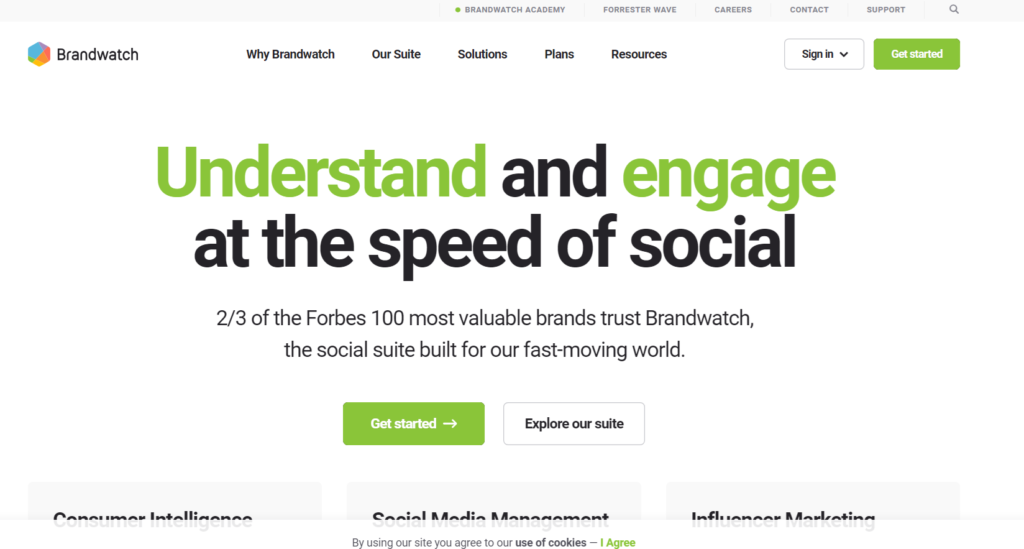
Brandwatch is a tool with features such as social media listening, social media monitoring, social media sentiment analysis, identification of influencers, and analysis of trends across social networks.
Key Features:
Social media search and analysis, post categorization or classification, identification of key influencers, tracking of trends, customized reports, data visualization, and compatible integration with multiple social media.
Pros:
- Some of the crucial features that include social listening and sentiment analysis
- Enhanced capabilities to generate report and for mapping the reports
- The two categories include Influencer identification and trend detection.
Cons:
- Inadequate tools and capabilities for the management of social media independently.
- Great deal of technicality involved in the process of handling complex analytics.
- Some of the prices charged by the providers to small business;
Website: https://www.brandwatch.com/
9. Keyhole
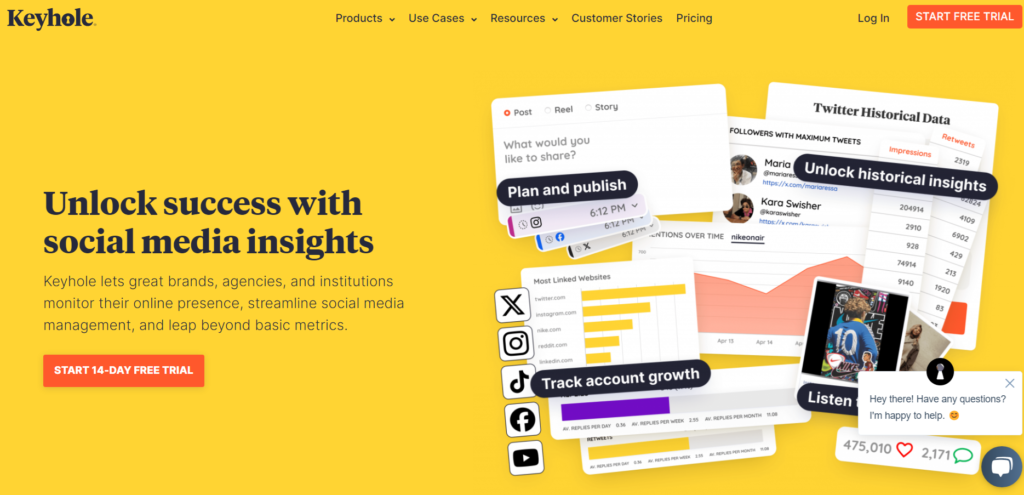
It is an innovative real-time social media analytics tool that provides detailed hashtag and keyword monitoring, a sentiment rating, and influencer tagging to different social platforms.
Key Features:
Real-time analysis, campaigns, and reports.
Pros:
- Real-time monitoring of its own flow as well as tracking of campaigns
- Hashtag and keyword tracking in social media.
- Identifying the online clients and influence of negative sentiments
Cons:
- Limited number of specific functions that could be managed in social networks alone
- Bundling more for additional functionalities and for team members costs higher.
- Includes only some accounts and their interactions with a few social networks
Website: https://keyhole.co/
10. Meta Business Suite Insights
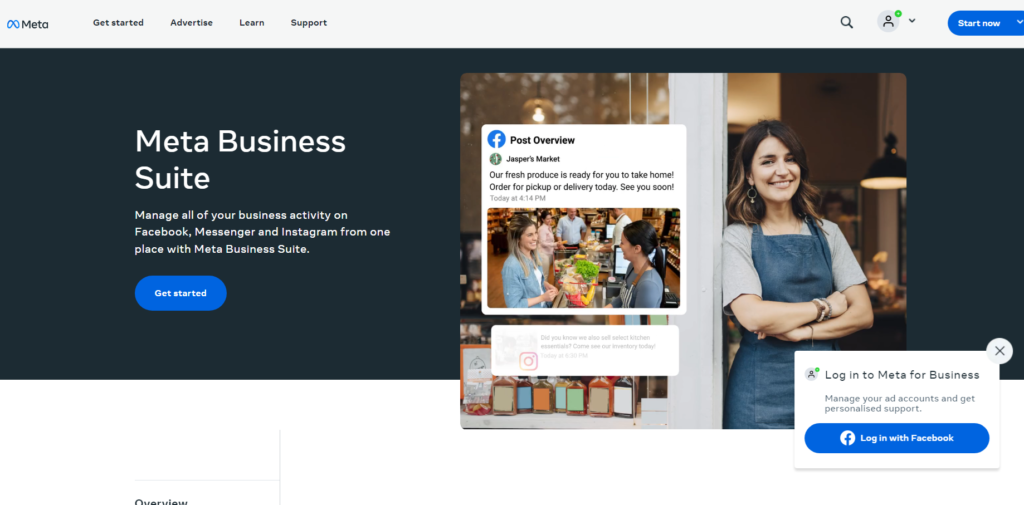
Meta Business Suite Insights is a free ad ally application that is developed by Meta for providing statistics of business accounts of Facebook and Instagram.
Key Features:
Understanding target demographics, analytics of the published content, audience interactions, and compatibility with various Meta advertising platforms.
Pros:
- This is available for Meta business accounts and also they are free to use.
- Integration of the solutions with Meta’s advertising and marketing tools may be possible.
- Both Facebook and Instagram adopted or continued implementing for better performance
Cons:
- Confined to Meta’s products which include Facebook and Instagram alone.
- Since analytics is intended for general business users, it incorporates basic analytical capabilities in contrast to dedicated analytical tools.
- No stand-alone social media management features that are exclusively tied to another feature.
Website: https://business.facebook.com/
11. Mentionlytics
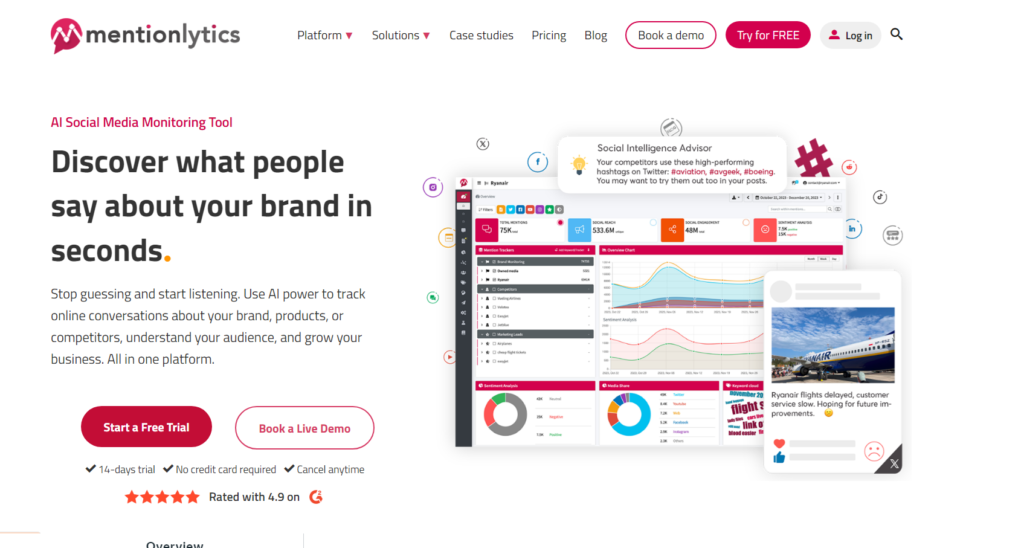
Mentionlytics is a web-based application helpful in the social media listening and analytics tools which work best for monitoring brand mentions, sentiment analysis and identification of the influencers on the social media platforms.
Key Features:
The tracking of brand mentions, potential brand health and position, influencer index, live stream, moving alerts and notifications, and compatibility with multiple social networks and other online media.
Pros:
- Brand mention tracking and an account of the sentiments dominating the social networking sites
- Identification of the right influencer and even real-time monitoring.
- Customizable alerts and notifications
Cons:
- Constrained professional options for social networking-platform management
- Higher prices on services such as enabling additional features and including extra members in the team.
- Some social networks’ API remains semi-open and squarely limited.
Website: https://www.mentionlytics.com/
12. Panoramiq Insights
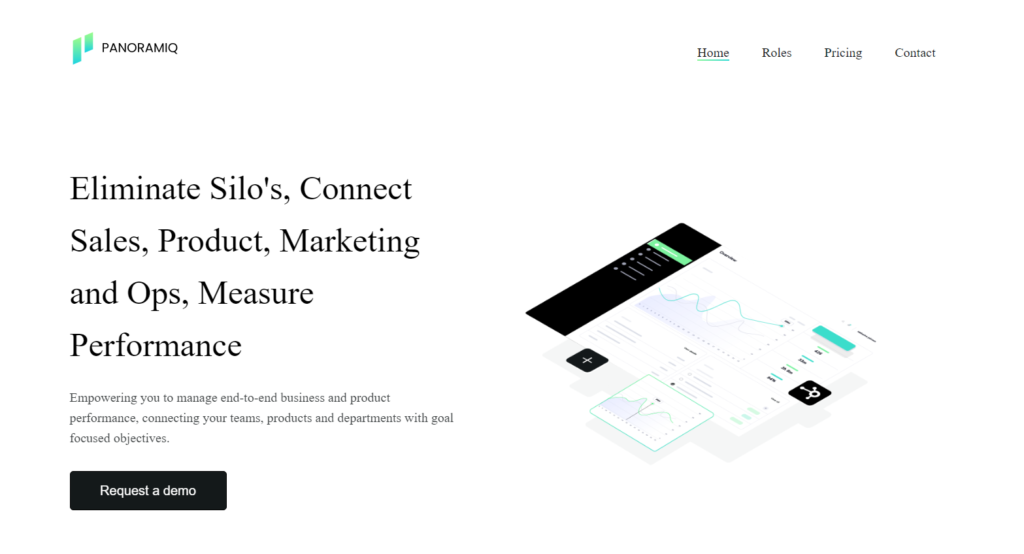
Panoramic Insights is an analytics platform that focuses on social media and offers users an easy way of measuring their online presence, as well as ideas on how best to engage their audience and a look into the competition.
Key Features:
Analytics across communication channels
Pros:
- Identification of the right influencer and even real-time monitoring.
Cons:
- Limited team collaboration features.
Website: https://panoramiq.ai/
13. Quintly
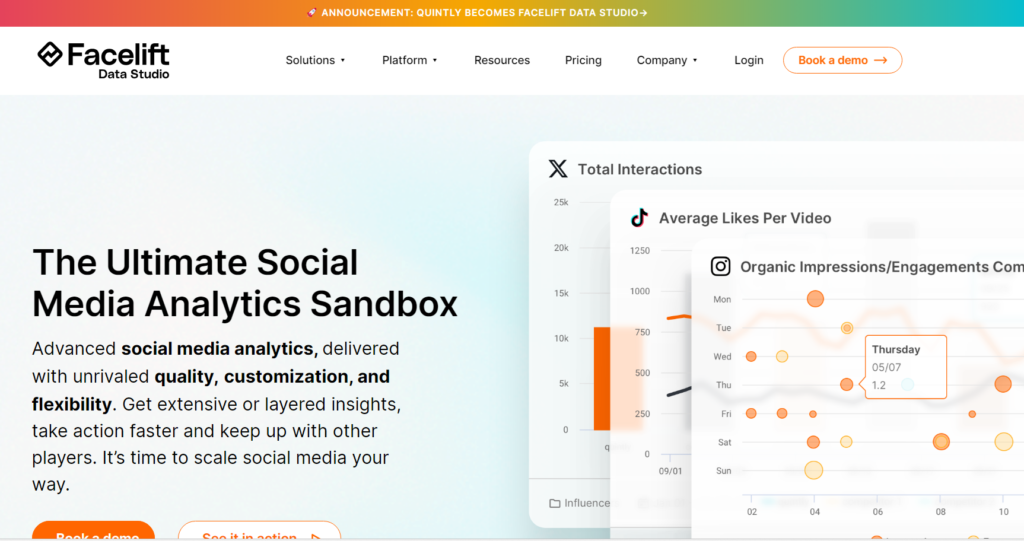
Quintly is a multiple-network social media analytics service that additionally comes armed with further sophisticated analytic features, benchmarking options, and customizable reporting.
Key Features:
It includes cross-channel analytics, competitor analysis, the option of customizable reports and/or home dashboard, integration between multiple operatives and different social networks, and team support.
Pros:
- Sophisticated tools for analysing data and identifying industry standards
- Customizable reporting and dashboards
- Team collaboration features
Cons:
- Basic functionality of standalone social media management.
- Relatively higher pricing for small businesses.
- High-slope indicates that the model can be more complicated for complex analytics
Website: https://www.quintly.com/
14. Iconosquare
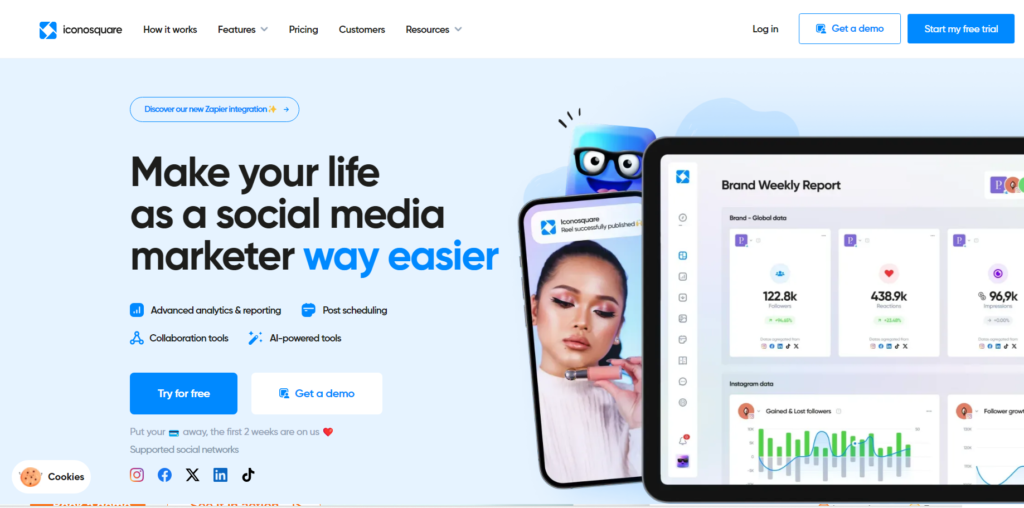
Iconosquare is one of the most robust tools available for analyzing an Instagram profile, with features that allow you to gain valuable insights into your audience, levels of engagement, and the overall performance of the content that you post to your IG account.
Key Features:
Audience insight, measurement of engagements and reach, features individual post analysis, tracking of hashtag, and benchmarking of competitors.
Pros:
- Extensive analysis and data processing required by Instagram
- Information on target audiences, as well as the data on how the content has Competitor profiling
Cons:
- The study only focuses on analytics in Instagram
- Higher prices for additional features
- Limited team collaboration features
Website: https://pro.iconosquare.com/
15. Google Analytics
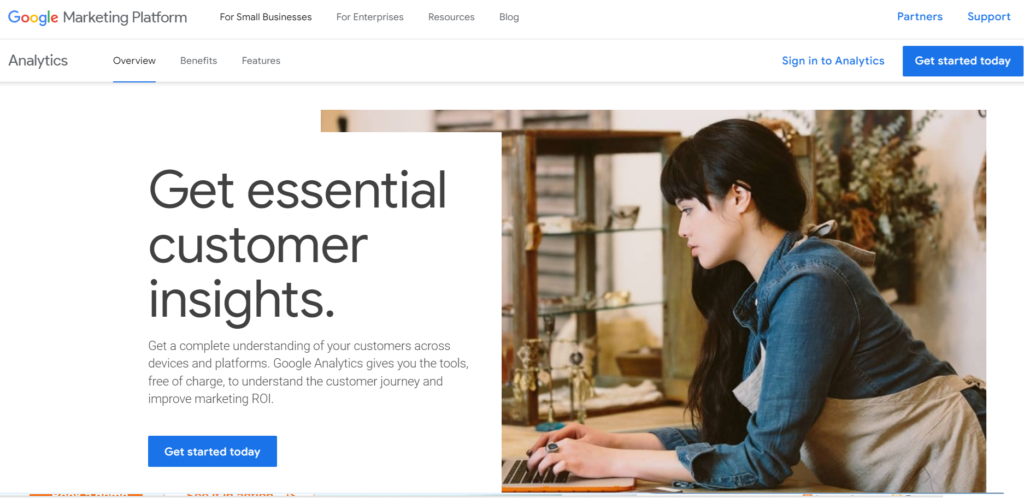
What makes it specific is that GA itself is not a social media analytics tool, but rather gives some insights into how social media drives traffic to one’s site and behaves once it gets there.
Key Features:
The tracking of the amount and sources of traffic to social media sites, actual conversion tracking, the identification of a site’s audience and the ability to integrate with other Google marketing modalities.
Pros:
- Getting detailed information about the website visits and nurturing the observations made throughout the visits.
- Synchronize this tool with other tools of Google’s marketing line,
- Basic features as in any typical freemium model, a basic set of features will be available for use free of charge.
Cons:
- Limited social media-specific analytics
- High degree of difficulty in learning
- There is no isolated functional modularity of social media management.
Website: https://analytics.google.com/
Conclusion
Social media continues to experience transformation as businesses strive to stay relevant in a competitive society; therefore, the a need for the right analytical tools.
In essence, through the use of these social media analytics tools, businesses are able to gain insights from the use of social media networks, hence enriching their strategies, improving their performances, and, in turn, generating higher returns on their investment in the social media networks.
FAQs
Hootsuite and Sprout Social are two of the strongest all-in-one social media analytics tools, with robust ecosystem-based features for content creation, monitoring, analysis, and team management across different networks.
Yes, here is the list of a few Free Social Media Analytics Tools where you can generate reports; Google Analytics, Meta Business Suite-Insights, Instagram-Insights, Tik-Tok-Analyzer, etc.
Iconosquare, it is a sophisticated analytical instrument oriented to Instagram with features such as demographics and content analysis, hashtags, and competitors.



